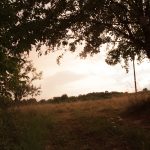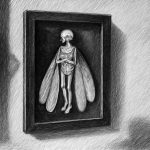Writing assignment 1. (2.0) *
The War.
You know.. What they don’t tell you about war is that most of the time you are waiting. You wait for
everything: the morning, the night, meals, an attack, aid, supplies. You are waiting for things to happen, and
you’re waiting for things to stop.
It’s all the waiting that makes you afraid or descend into madness.
Sure, there are some that can’t handle seeing the enemy crawl over the battlefield towards you or the noise
and the brutality. But it’s the waiting that really gets you.
I found the attacks and the fighting a welcomed break – a relief almost – from the waiting and the
mundanity of the days. It was messy and brutal, but I didn’t have to wait any longer when I saw the enemy
approach through the wreckage of the land.
Ah! The land..
At first the land wasn’t wrecked, of course. It looked like Gods own paradise from the Good Book. Green,
thick grass, big trees laden with unripe fruits and leaves around the entire perimeter, and flowers. The
flowers… Seemingly endless lines of them. There were so many and of such colours that even I – a boy that
grew up on a farm – hadn’t seen them before. It was a true wonder and beauty I first saw when I arrived.
It didn’t take long before the Enemy had turned Eden into Hell. Grass, flowers and even the trees became
victims of the fighting. Sure, our side did some damage as well – it was war, after all – but the Enemy is the
one to blame.
I was just a kid, barely 17 when I got there. I had volunteered and was eager to fight! We were the good guys
and they were the Enemy: evil and cruel.
The summer was high when I finally got there. It was a warm and wet summer, and it seemed to be of the
liking for the Enemy. It was if they spawned out of the wet ground in never ending numbers. Rows upon rows
they came. Charging, wreaking havoc and doing all the mischief they could manage before they got
destroyed. It was messy business. I became somewhat of an expert on traps. I improved some old ones and
created some new ones. I had something that looked and worked almost like a mousetrap, pits and holes
filled with chemicals or poisons, strings, spikes and wires for them to get caught and stuck on. I don’t know
how many of the enemy I destroyed that summer. Hundreds. Perhaps thousands. It was never ending. At
first I felt pity and sorrow for them. But as time went on it grew into contempt and disgust and in the end I
didn’t feel anything. It became a job like any other. Like herding sheep’s or delivering the newspaper in the
morning as I did as a kid.
But as I said: it was the waiting that was the hard part. It became difficult to sleep at night because I knew
that the big ones would cross silently towards their goal. All black, huge and invisible in the night. Creeping
slowly and steadily they passed the traps as if they didn’t even care about the poison or the chemicals.
These were mean bastards. They could destroy more in one night than a whole legion of their smaller
companions would in a week.
But in the end they succumbed as well. Almost all of them did. It was ruthless.
At the end of the summer I went home. The battle was over. We had won, to the extent that anyone could be
called victorious in this battle. So much destruction. The grass was all but gone. The fruit and leaves of the
trees brown and wittered, and the roses and other flowers were no more.
You couldn’t fathom the destruction these garden snail caused. The infestation that year was horrible and
gardens all over the country had them. They destroyed lawns and flower beds. I fought back for as long as I
had to. It was a hard and brutal war, and the memories are still with me. I am done fighting now.
I got myself a nice place to live now. But I don’t have a garden.

